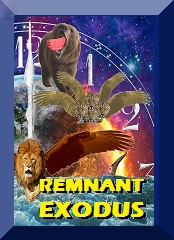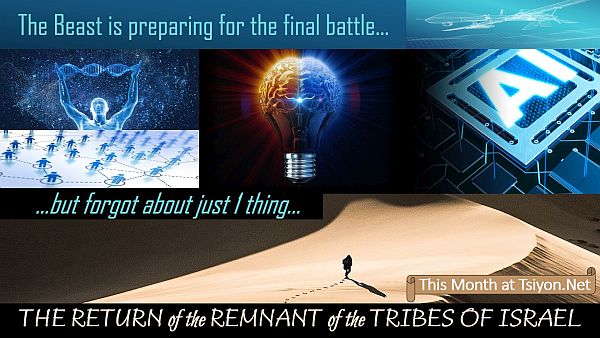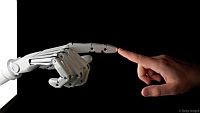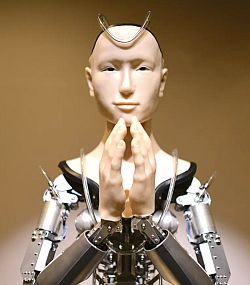|
|
|||||||||
~ Pass this newsletter on to a friend! ~ |
Every Sabbath | ||||||||
 | |||||||||
 | |||||||||
Keep Tsiyon Road | |||||||||
|
Join us online tonight! | |||||||||
| |||||||||
|
**************************************** From Eliyahu: Shalom friends,
It appears that 21st century technology is developing far faster than the ability of most people to keep up with it. Already a lot of the science fiction of the 20th century is a normal part of 21st century life. For example, the hi-tech communicators of Dick Tracy or Captain Kirk are more than duplicated in your ordinary cell phone. If that technology could make the leap from fiction to reality, why not AI? Indeed some hold that AI has already passed the 'Turing Test' in a number of important areas. That test was named after Alan Turing, who invented it in 1950. In 1951 he predicted: �At some stage� we should have to expect the machines to take control.� What is the essence of the Turing Test?
The rate at which artificial intelligence systems are surging forward in just the last few years have some people delighted and others alarmed. A growing number of informed experts are starting to believe that Futurist Ray Kurzweil may be right. He famously predicted that �By 2029, computers will have emotional intelligence and be convincing as people.�
The Bible answer to these questions is very simple: God created man in His own image, with moral characteristics and abilities that transcend mere data processing. While machines may be able to process data far faster than any human, they will never be able to love anyone, or even care about anyone, despite a cute little face of molded plastic. Yet, more and more, we are foolishly handing the machines the keys to our communities, our communications, our economy, our homes, and even our lives. This is, indeed, a frightening picture for the near future of this world. The ELIZA effect, the tendency of humans to anthropomorphize objects, is nothing new. In ancient times people worshipped carved idols as if they were real gods. Now AI is arising as a new kind of image, in a world that already idolizes technology and the pseudo-science religion. Revelation 13 tells us where this is all headed:
Knowing Yeshua guards us against the lies and deceptions of the enemy. Join us tonight at tsiyon.net, at 8 pm cst, to understand why. Shalom,
Eliyahu **************************************** Editor's Note: This article is clearly written by someone poking fun at God and religion. I include it here purely as news. Robot priests more acceptable to Protestants than Catholics, says professor Can AI create better priests? Are we prepared to worship via machines rather than fallible humans? A Villanova University professor believes a post-human priesthood has its advantages. Reprint: ZDNet, September 20, 2019
Everything is instant, yet nothing seems real. The news is apparently as fake as people on the take. Yet we're desperate to believe in someone -- or even something -- that'll help give our lives meaning. For many -- though, perhaps, a dwindling number -- religion provides answers. Or merely some comfort. Step into a church, and you hope to be embraced by values and celestial guidance. Somehow, though, suspicion about God's human (alleged) intermediaries has grown. I was moved, therefore, by an article in Vox that explored the notion that religion will be "transformed" by artificial intelligence. Already, a Buddhist robot priest called Mindar is offering its wisdom to worshippers in Kyoto, Japan. It's not powered by AI, but it is empowered to offer Buddhist teachings to a no-doubt rapt congregation. It's not difficult, though, to imagine a robot priest, bathed in supreme religious wisdom by the power of AI. Recently, the subject has invoked humor. This is largely thanks to Anthony Levandowski, the former Google and Uber engineer currently embroiled in a lawsuit as to his, well, ethical purity. A couple of years ago, he announced the creation of a Church of the AI God. At the time, he explained: "It's not a god in the sense that it makes lightning or causes hurricanes. But if there is something a billion times smarter than the smartest human, what else are you going to call it?" Um, an annoying know-it-all, perhaps? Is it possible, though, that some familiar religions might embrace a robot priest, rather than the more fallible kinds the real world seems to produce. For example, one of the first things that come to many minds if you mention the Catholic Church is the constant sexual abuse and pedophilia scandals. Perhaps a non-human priest -- armed with all the holy knowledge imaginable and none of the unholy behavior -- might be the perfect way to renew the faith. Ilia Delio, a professor of Christian Theology at Villanova University, offered Vox some fascinating thoughts about this. Instead of trying to persuade Catholic worshippers that priests are somehow divinely consecrated, she said, perhaps the existence of robot priests would offer a new perspective on being a good person to deserve eternal life. "We have these fixed philosophical ideas and AI challenges those ideas. It challenges Catholicism to move toward a post-human priesthood," she said. Perhaps some would feel enchanted at being offered spiritual guidance by a robot. Perhaps they'd think this was far better than the same old stuff Father Seamus has peddled for the last 20 years. (A confession: I was brought up in a severely, manically Catholic household. It was so manically Catholic that I haven't been to confession for decades. Nor, for that matter, to a Catholic Church, save for a couple of funerals.) Delio jested that robot priests have a better chance of being embraced by Protestants than Catholics. The former tends toward the more stoic and the less soaring than the latter. There is, though, still one large philosophical problem. Or, rather, a technological one. As with so much in AI, what matters most is who programs the robot. Elements of faith are -- despite fundamentalist protestations -- open to interpretation. If all robot priests were Bible-thumping fundamentalists, that might deter the faithful. Moreover, how easy would it be to tamper with their teachings? Imagine an unscrupulous Russian hacking a robot priest to tell Sunday's congregation that they should send their alms to Blessed Putin Fellowship Foundation. Still, some religions are wising up to the power of AI in a slightly different way than offering robotic holy beings at the altar. Recently, the Church of England created an Alexa skill so that, at any given existential moment of woe, you can call on your deity just by commanding Alexa to fetch it/him/her. I know that those in favor of the Great Singularity believe that humans will soon be gods. Robotic gods, that is. Perhaps having a robot priest merely places us halfway to our own personal heaven. It's artificial, of course. **************************************** ****************************************
You can tune in to Tsiyon Road from around the world by using one of the
free apps on you mobile device from
| |||||||||


| |||||||
| |||||||
�2019 Tsiyon - Tsiyon A130-425, 5701 W Slaughter LN, Austin, TX, USA, 78749 You may leave feedback, prayer requests and comments here. Please donate online here. | |||||||





 Are you
sick of hearing about AI (artificial intelligence) yet? Other than flying
machines, strong AI is probably the most anticipated technology in history.
Interest in it, and predictions about it, go back at least to the early part of
the 20th century. As far back as silent movies there were depictions of
intelligent robots as friends of man, or as sinister overlords and enemies.
Superman animations from the 30s pitted the "man of steel" against intelligent
robot enemies. Later, movies like The Terminator and The Matrix predicted a
future world dominated by super-intelligent machines. With its sci-fi past, it
is hard for many of us to take AI as a serious threat to mankind. This
reluctance to see such a threat is still true, despite dire warnings of the
dangers of AI by some of this world's notables in technology, like the late
Stephen Hawking and the wonder-boy, Elon Musk.
Are you
sick of hearing about AI (artificial intelligence) yet? Other than flying
machines, strong AI is probably the most anticipated technology in history.
Interest in it, and predictions about it, go back at least to the early part of
the 20th century. As far back as silent movies there were depictions of
intelligent robots as friends of man, or as sinister overlords and enemies.
Superman animations from the 30s pitted the "man of steel" against intelligent
robot enemies. Later, movies like The Terminator and The Matrix predicted a
future world dominated by super-intelligent machines. With its sci-fi past, it
is hard for many of us to take AI as a serious threat to mankind. This
reluctance to see such a threat is still true, despite dire warnings of the
dangers of AI by some of this world's notables in technology, like the late
Stephen Hawking and the wonder-boy, Elon Musk. At
first, it seems like a high bar for a computer program to hold such a convincing
conversation with a human that it would be accepted as one. However, it turns
out that human listeners make that easier than it would otherwise seem. Would
you believe that a computer program from as far back as 1966 was able to get
people to respond to it as if it were human? Here's the story:
At
first, it seems like a high bar for a computer program to hold such a convincing
conversation with a human that it would be accepted as one. However, it turns
out that human listeners make that easier than it would otherwise seem. Would
you believe that a computer program from as far back as 1966 was able to get
people to respond to it as if it were human? Here's the story:  In recent years AI has had some amazing successes, such as
beating all comers at even the most difficult strategy games, such as Chess and
Go. Even Poker, a game of bluffing, has been mastered by AI. Further, a recent
study found that AI can now diagnose medical images as accurately as human
doctors. Even AI music and poetry, an area that many had thought could never be
the domain of AI, is now becoming indistinguishable to humans. Consider this:
In recent years AI has had some amazing successes, such as
beating all comers at even the most difficult strategy games, such as Chess and
Go. Even Poker, a game of bluffing, has been mastered by AI. Further, a recent
study found that AI can now diagnose medical images as accurately as human
doctors. Even AI music and poetry, an area that many had thought could never be
the domain of AI, is now becoming indistinguishable to humans. Consider this: This possibility has the scientific community talking
about, of all things, spiritual questions. Further, they readily admit they
don't have even simple answers to questions like; What is consciousness? Even
harder; What is the human spirit? How about: What is life? Believing in
materialistic Darwinism, they are wondering if AI will 'evolve' into a new form
of 'life' - machine life, and if so, what will that mean for humanity? Clearly,
AI can be programmed to present as human in any number of different areas, but
is that the same as being human?
This possibility has the scientific community talking
about, of all things, spiritual questions. Further, they readily admit they
don't have even simple answers to questions like; What is consciousness? Even
harder; What is the human spirit? How about: What is life? Believing in
materialistic Darwinism, they are wondering if AI will 'evolve' into a new form
of 'life' - machine life, and if so, what will that mean for humanity? Clearly,
AI can be programmed to present as human in any number of different areas, but
is that the same as being human? Realizing
where the world is so quickly headed, we do well to look to Yeshua in
earnest. He is our only real defense against the sinister plot of the enemy
that we see even now being constructed before our eyes. Yeshua imparts to us
light, truth and freedom that the world cannot even understand, much less
overcome.
Realizing
where the world is so quickly headed, we do well to look to Yeshua in
earnest. He is our only real defense against the sinister plot of the enemy
that we see even now being constructed before our eyes. Yeshua imparts to us
light, truth and freedom that the world cannot even understand, much less
overcome.  Our
faith in almost everything is being tested these days.
Our
faith in almost everything is being tested these days.
